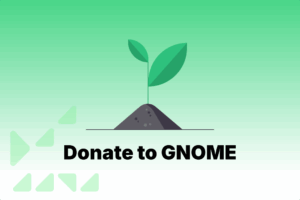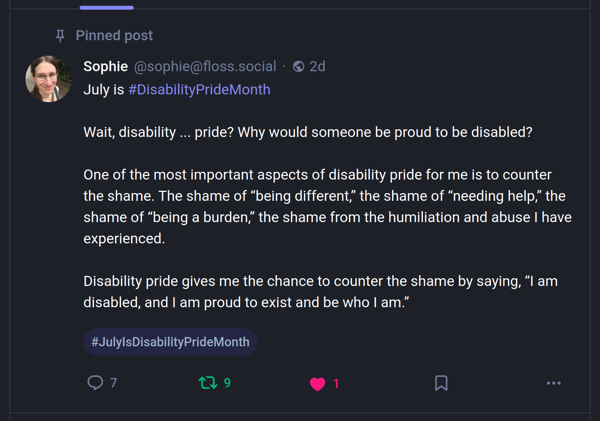## Opaque Stuff
- some preliminary internal policy drafts
## Annual Report
Most of this week was spent creating a draft of the 2025 annual report. I’ve never created an annual report for a non-profit before, so it was a fun exercise! It did consume enough time that I’ll be creating my GUADEC slides on the airplane, though. 😉
Thanks to everyone who contributed to the Annual Report / 2025 Successes issue in GitLab. I know this was a bit of a scramble, and I appreciate everyone taking the time to chip in.
The draft is at the bottom of that issue. You can use Toolbx (as described in the README) or Mise to run it locally. If your GNOME contributions from this year are missing, please shout at me on Matrix! I’m certain I’m missing achievements from the past 18 months.
## 501(c)(3) Details
I was curious to know if an annual report was a legal requirement for 501(c)(3)s in California. Much like limits to retaining capital, the answer is “no” … but there is a sort of soft compliance value in producing an annual report in the same way that it looks better to the IRS if a non-profit doesn’t sit on a half-billion dollars like a cave dragon. (Not naming any names, of course.)
We spent a bit of time this past week looking at the Public Support Test. This is yet another great reason to have regular, recurring, unrestricted contributions from a wide variety of GNOME users. These donations don’t just keep GNOME humming but they also validate the Foundation as a 501(c)(3). The Public Support Test takes users’ love of GNOME and transmogrifies it into IRS compliance. 😉
The language on that page is obnoxiously vague (UNITS, people) so let’s take a look at the first and most important sentence to see what it actually means:
The simplest definition of the IRS public support test states that at least 1/3 (33.3%) of donations must be given by donors who give less than 2% of the nonprofit’s overall receipts.
“33.3% of donations” specifically means dollars. The “2% of receipts” also just means, uh, dollars. It’s unclear to me why they don’t just, you know, say that. Anyway, this explanation/example is clearer than any of the 3 listed on the page, in my opinion:
If your nonprofit’s total support over 5 years is $1,000,000:
- 2% = $20,000
- If Donor A gives $50,000, only $20,000 counts toward public support
- The extra $30,000 is still counted as total revenue, but not toward the “public support” percentage
This rule only applies to large individual, corporate, or private foundation donors — not to:
- Government grants
- Public charities
- Broad-based fundraising (small donors)
In short, while it’s possible to pass the Public Support Test with revenue from grants and other charities, the most resilient public support (and revenue stream!) comes from individual donors like you. (Or, like, your users if you’re a hacker.)
## Hackers
While the Steven Levy book (Hackers, 1984) is a bit dated now, there’s just so much I love about it. It was easily my favourite Covid lockdown read. In the earlier days of GNOME, I remember the term “hacker” being thrown around a lot more. I’d like to encourage folks to bring that back.
However, I’d also like to lean into the idea that “hacking” has more to do with its original definition than it came to mean thanks to ESR’s essays, or whatever. “Hacking” is just the activity of tearing down a system, understanding it, and building something new (and hopefully better) out of it. You can hack on design. You can hack on linguistics. You can hack on event management. You can hack on gardening.
“Contributor” is such a boring word (and ambiguous when donors are in play). When I say “hacker” in the above section, I’m referring to anyone who contributes to GNOME in this way. Not just developers.
## Retaining Capital
I’ve had a couple people tussle with me a bit recently — over the idea that the GNOME Foundation should hold onto enough capital to see it through some rough times. At least one of these conversations was off the back of my earlier comment in the June 6th Foundation Report that 501(c)(3)s have no capital retention limits whatsoever. Because they don’t.
I need to clear the air, here. I’m not suggesting that the GNOME Foundation hold on to $20 million USD and slowly fritter it away. I am suggesting that, in conjunction with continuously fighting for smaller recurring revenue sources, the Foundation should ensure it has enough capital reserve to continue operations for a reasonable length of time. Given that the Foundation has run a deficit for 5 years in a row, I would say “a reasonable length of time” is… 5 years. But I know the Board will never set a half-decade-long reserve policy, so my suggestion is 12 months while we’re in lean times (which is to say, now) and 18 to 24 months when the Foundation is in a healthier financial position.
How much is that? For the sake of argument, let’s say our monthly burn rate is $41,666. (It’s not, but I like round numbers.) That means an 18-month capital reserve would be $1.5 million. If you are the sort of person who jumps at that number and says “oh my god! that’s a ton of money!” then I suggest starting a small business, growing it, and deciding what you consider a safe reserve policy for the wellbeing of your 5-100 employees (which is your responsibility, as a business owner). $1.5 million is a lot of money for an individual. It is not a lot for a corporation of any size whatsoever.
But we could cut! The current wording of the Board Reserves Policy uses the words “core spending.” This language drives me a little nuts. It implies there is a “core” to the Foundation that we can drop services and staff to somehow achieve. That’s absurd. If we can cut spending and still retain our core functionality as a non-profit, we should do that immediately, not when we start burning the capital reserve. We run this organization on donations. Some of those donations come from extremely generous people on low incomes. It is my responsibility, under the policy direction of the Board, to responsibly steward the organization such that we take those donations seriously and respect every dollar donated by GNOME’s users. There are many approaches to this: one is to ensure the GNOME Foundation isn’t spending money it shouldn’t or running programs that don’t benefit GNOME, but another is to build network resilience and cross-functional execution into our staff (me included), to ensure that all operations are “core” operations.
Okay, diatribe over.
I met Tobias on Monday (and Adrian on Friday) to chat about some efforts we can make to increase the health of the GNOME community, with respect to interactions between individuals. One topic that’s come up (not only with Tobias and Adrian) is a private space for Foundation Members. At the moment, we don’t really have such a space, so we air our grievances in the relative public of Matrix and Discourse. That’s not ideal. A healthy debate — or even an outright argument with heated emotion — might leave the participants in friendly standing at the end, but leave the peanut gallery aghast or agog.
I had a similar conversation with Aaron Prisk and Mauro Gaspari from Canonical later in the week. We need better spaces for hashing out certain discussions, with varying degrees of transparency. Ultimately, the execution is always public. We’re not going to lock down GitLab and start throwing tarballs over the wall to our users. Usually the collaboration can be public, too. But sometimes the earlier stages need to take place in a coffee shop, not the town square.
These are ideas that require contemplation and iteration, obviously. But I’d love to hear your thoughts.
## More Friends
I met Amy Parker from OpenSSL this week. It’s amazing to me just how friendly and cool people are out there in the wider Freie Software community. We’ve all got some variation of the same difficulties (Open Source Foundations: They Are Weird), and it’s hugely reassuring to have a massive, global network of allies fighting alongside us.
## Preliminary Board Assignments
The new board members met on Tuesday to discuss potential officer positions and committee assignments. Nobody was murdered. It was a productive conversation. Yay for us.
## More Resilience and More Resilience
We keep chipping away at the GNOME Foundation’s services, inching our way to a position where we’ll have at least three (3) owners/signatories/root users for every service, bank account, and tool. This week was another long Tuesday call with Rosanna, mostly around banks and banking tools. Thanks for the help, Rosanna!
We also met our bank’s account manager later in the week. We finally (finally) have two people with signing authority. Hooray!
## Meeting the Bookkeepers
Deepa (our new treasurer) and I had a lovely conversation with our primary bookkeeper on Friday to take an initial look at the draft 2023/2024 financial report we’ll use for the Annual Report.
We have a long list of questions for both our bookkeepers. We have a primary bookkeeper who, naturally, keeps our books. We also have an advisory bookkeeper who helps with the stickier non-profit accounting and treasury questions.
## GUADEC
It’s GUADEC soon! The GNOME Foundation’s Advisory Board meets on July 23rd, then the conference, and then we have Sunday and Monday for a bit of a “Board Hack Day” … trying to clear out old issues, resolve unfinished business, and give the year with the new board a strong start.
If you’ll be at GUADEC, I’ll see you there! Until next week.

